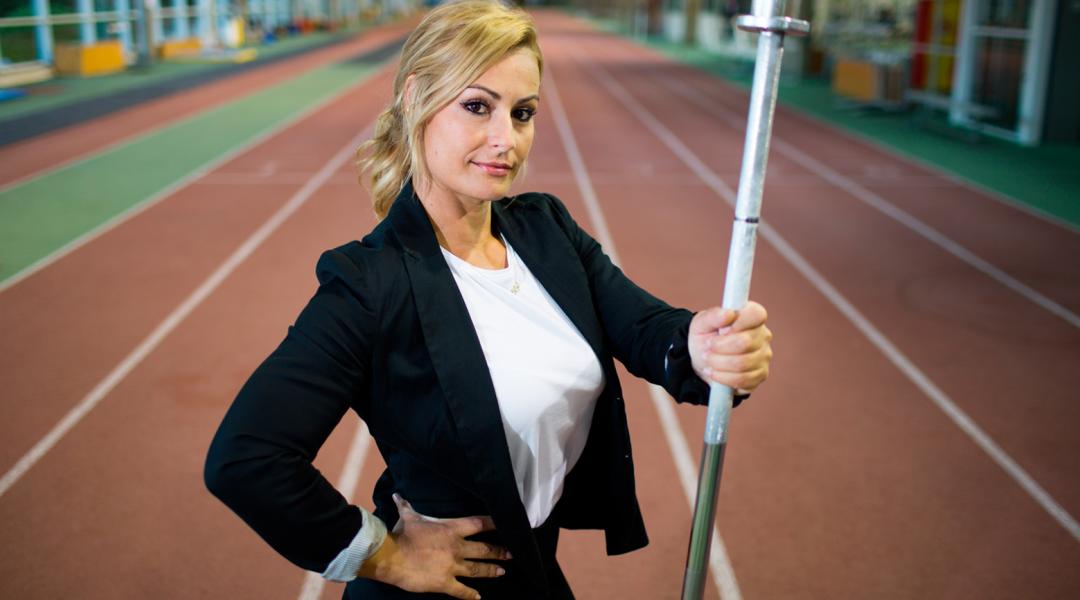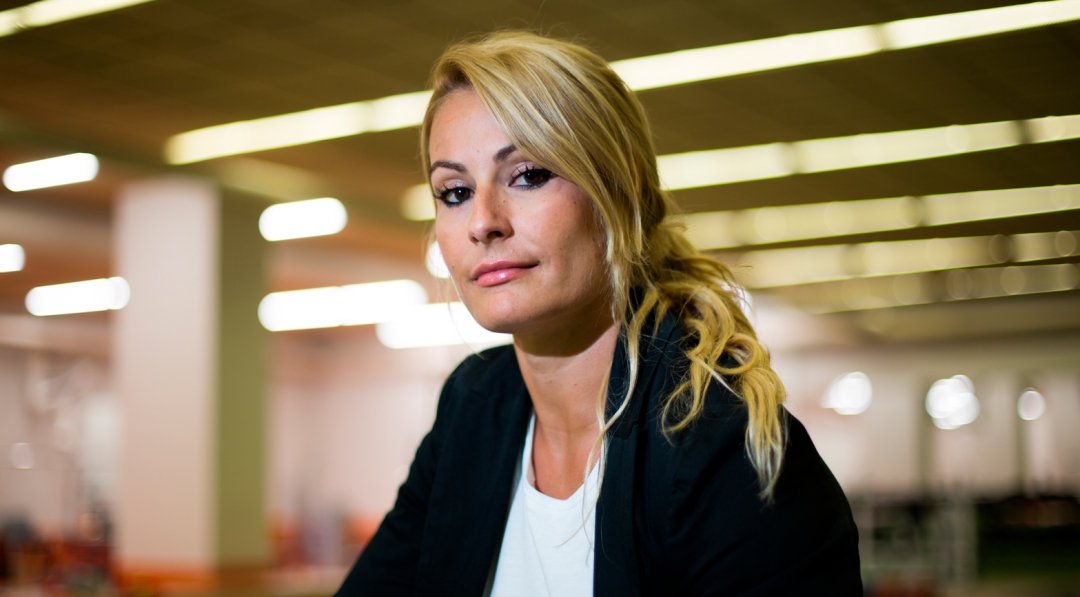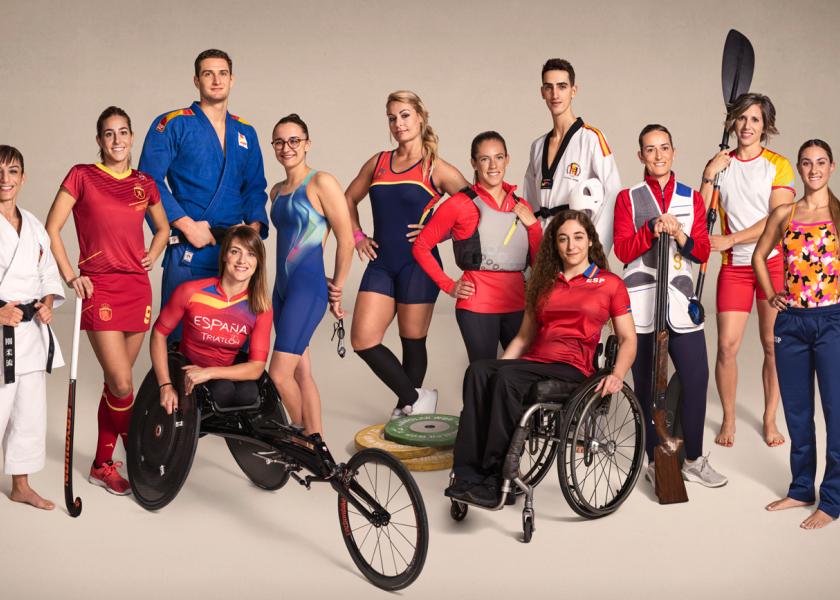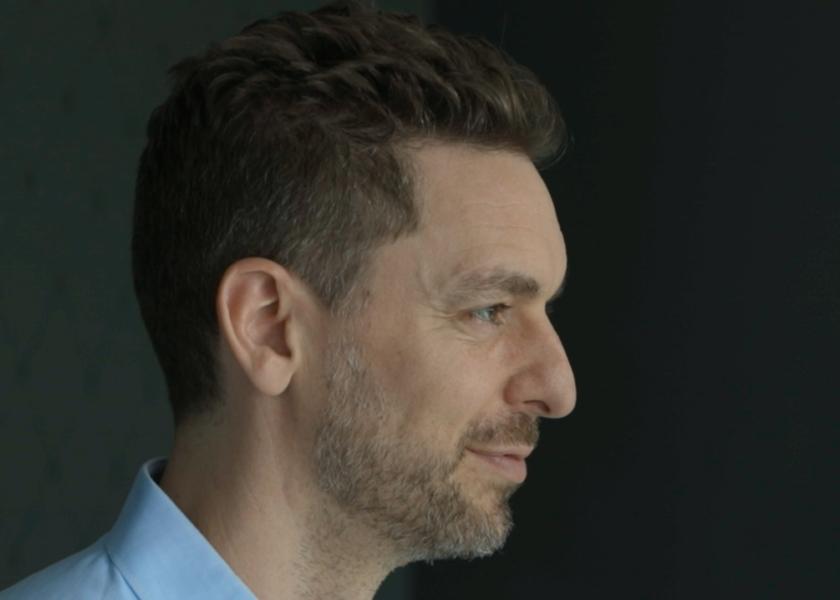Lydia Valentín
How to Lift Your Sport up to Heaven

Tokyo will be Lydia Valentín’s fourth and final Olympic Games. While the Spanish weightlifter has won her fair share of medals, this time her objective will be to make a clean sweep, as the crowning achievement of a brilliant career. She tells us this in an interview during a break from the tough training sessions she is immersed in, at ten months from the big event.
Not even she could imagine, at the age of 11, when she was deciding whether to pursue a career on the weightlifting platform or on the basketball court, that the great vision of her first coach would lead to her becoming the symbol of a sport that, in Spain, was known to only a few people. “His eye fell on me because he saw talent, attitude, and aptitude. He saw that I really liked to stand out in sport, and that I had ambition,” she says in the middle of our photo shoot at the Joaquín Blume sports residence in Madrid. Ever since, Lydia Valentín (León, 1985) has been working hard to make a name for herself in the weightlifting world and secure a spot among the most illustrious athletes of our country. Her London 2012 gold, Beijing 2008 silver, and Rio 2016 bronze medals, as well as two world championships and four European titles attest her status, without mentioning the other ten bronze and silver medals the athlete has on her wall.
Her smile and trademark celebratory gesture—forming a heart with her hands as she tilts her head—are a stark contrast to a sport as physical and powerful as hers, and in which she has been a household name for years. Lydia, championing the figure of the sportswoman, knows it, and is “ever so proudly” aware that, thanks to her presence, “many more girls and women are practicing weightlifting now.” Likewise, she is proud to point out that “the role of women in Spanish sports is incredible. We’ve seen that reflected in the past editions of the Olympic Games, both in London and in Rio, where we’ve won many medals.”
She realises that her herculean limbs, apart from lifting weights, have inspired more than one to lift themselves from the couch and get hooked on weightlifting. “Future generations will have a path already set out and, above all, they have role models in different disciplines,” she calmly states.
“The role of women in Spanish sport is incredible. We’ve seen that reflected in the past editions of the Olympic Games, both in London and in Rio”
Against doping and preconceptions
Highlighting national women’s sports and drawing the attention of the Spanish public to a discipline that was virtually unknown years ago are two of the most difficult things Lydia Valentín has had to face and has overcome. But they are not the only ones. A resounding, dry and forceful “Yes” is the answer to the question we asked her about whether she feels weightlifting as a sport is more affected by doping than others. “It's not that weightlifters are checked for doping more; it’s just a sport where there have been many cases, because it's a discipline in which strength is very important,” she admits.
She also stresses that she can “sleep calmly, knowing that nobody is going to come to claim those medals,” in reference to the two medals she received years after the facts, because of her competitors being disqualified. “My rivals committed foul play. While it’s not the way I would have liked to have achieved and celebrated those medals, I’m optimistic and can say that I have them and that I’ve won them,” she says before proudly stating that “the real Olympic champion in London and the runner-up in Beijing is me.”

Tokyo will be Lydia Valentín’s fourth and final Olympic Games. © Rafael Fabrés
Experience and talent for Tokyo Olympics
We can only hope the circumstances won’t be repeated, but the result will. It would be a great joy for our country and for Spanish sports to see the Leonese weightlifter on the podium again. “I’m very motivated, as I was with the previous three games, and eager to start training,” says Lydia, who at the same time can’t deny that, given her track record and ambition, once she classifies, “my goal will be to fight once again for an Olympic medal, without forgetting the work that entails and how hard it will be.” Even though, according to the criteria of the COE (Spanish Olympic Committee), she doesn’t qualify for the responsibility, Lydia dreams about being the flag-bearer of the Spanish delegation in Tokyo: “That would be an absolute dream.”
As a participant and medallist in previous Olympic Games, she will be able to advise the first timers. “Anyone who’s qualified for the Olympics is a top athlete, no matter the discipline. My advice is to enjoy it and let the work involved in getting to the Games show,” she says with a smile.
She gets excited just by imagining herself competing in the Japanese capital next summer. “For me, Tokyo is the big challenge, the big goal, the big dream. It’s why I train and why I wake up every day, from a sporting perspective, with enthusiasm and motivation,” she says. The athlete has already confessed that these will be her last Olympics, so she wants to live the event to the fullest, enjoying the road leading to it, and with the goal of taking home a new medal (which would be historical, as that would make four medals in four Olympic Games). If anyone can carry that weight, it’s Lydia Valentín.



